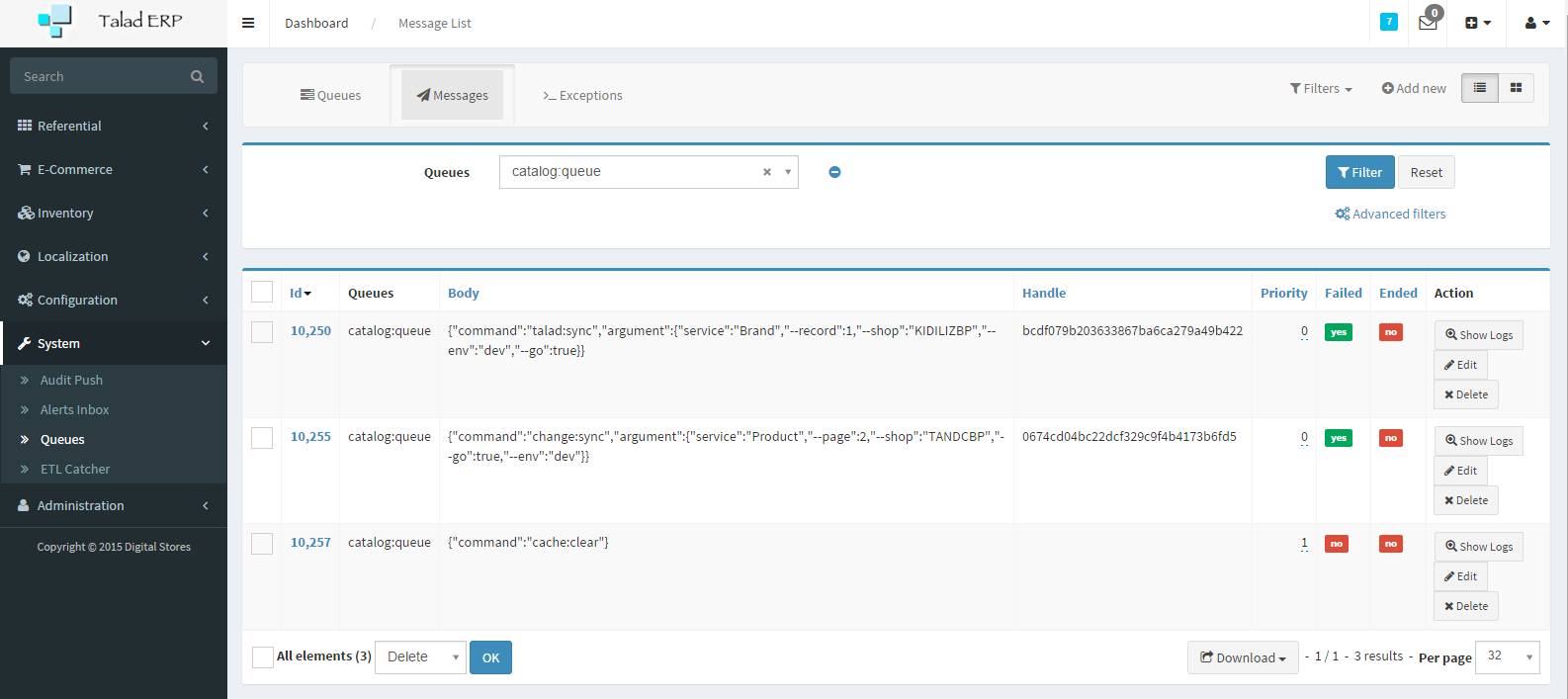This bundle provides the use of Zend Queue from Zend Framework. It allows your Symfony application to schedule multiple console commands as server-side jobs.
See the Programmer's Reference Guide for more information.
Features:
- Manage multiple queues
- Schedule your Symfony commands
- Monitor messages and log exceptions
- Retry logic
- RabbitMQ or database support
Require heristop/jobqueue-bundle to your composer.json file:
{
"require": {
"heristop/jobqueue-bundle": "dev-master"
}
}Load the bundle in AppKernel:
$bundles[] = new Heri\Bundle\JobQueueBundle\HeriJobQueueBundle();If you use the Doctrine adapter, update your database:
app/console doctrine:schema:update --forceIf you use the Amqp adapter, you may configure the connection in this way:
# app/config/config.yml
heri_job_queue:
amqp_connection:
host: localhost
port: 5672
user: guest
password: guestFirst, define a message which contains the Symfony command to call. For instance, we choose to add the clear command in a queue named "queue1":
$queue = $this->get('jobqueue');
$queue->attach('queue1');
$queue->push([
'command' => 'cache:clear'
]);You can also call commands with arguments:
$queue->push([
'command' => 'demo:great',
'argument' => [
'name' => 'Alexandre',
'--yell' => true
]
]);Then, add the queue to listen in the configuration:
# app/config/config.yml
heri_job_queue:
enabled: true
max_messages: 1
queues: [ queue1 ]Note: The queue is automatically created, but you can also use the command-line interface in this way:
app/console jobqueue:create queue1To run new messages pushed into the queue, execute this command:
app/console jobqueue:listenYou may specify which queue connection the listener should utilize (skipping configuration):
app/console jobqueue:listen queue1You may also specify the number of seconds to wait before polling for new jobs:
app/console jobqueue:listen --sleep=5To process only the first job on the queue, you may use the jobqueue:work command:
app/console jobqueue:workTo see the pending jobs, run the command below:
app/console jobqueue:show queue1If a job failed, the exception is logged in the database, and the command is call again after the setted timeout (default 90 seconds):
To delete all of your failed jobs, you may use the jobqueue:flush command:
app/console jobqueue:flushJobs are executed in the order in which they are scheduled (assuming they are in the same queue). You may also prioritize a call:
$queue
->highPriority()
->push([
'command' => 'cache:clear',
]);If you use the Doctrine Adapter, you may use Sonata Admin to monitor your jobs:
#
# more information can be found here http://sonata-project.org/bundles/admin
#
sonata_admin:
# ...
dashboard:
# ...
groups:
# ...
System:
label: System
icon: '<i class="fa fa-wrench"></i>'
items:
- admin.queueThe jobqueue:listen command should be runned with the prod environnement and the quiet option to hide output messages:
app/console jobqueue:listen --env=prod --quietTo avoid a memory leak caused by the monolog fingers crossed handler, you may configure the limit buffer size on config_prod.yml:
# app/config/config_prod.yml
monolog:
handlers:
main:
type: fingers_crossed
action_level: error
handler: nested
buffer_size: 50Linux ProTip:
To run the command as a service, edit jobqueue-service shell in Resources/bin.
Set the correct PROJECT_ROOT_DIR value, and copy this file to /etc/init.d.
Then use update-rc.d:
cp jobqueue-service /etc/init.d/jobqueue-service
cd /etc/init.d && chmod 0755 jobqueue-service
update-rc.d jobqueue-service defaultsTo remove the service, use this command:
update-rc.d -f jobqueue-service removeIf the service stopped suddenly, you may use supervisord to restart it automatically.
A sample config might look like this:
[program:jobqueue-service]
command=/usr/bin/php %kernel.root_dir%/console jobqueue:listen --env=prod
directory=/tmp
autostart=true
autorestart=true
startretries=3
stderr_logfile=/var/log/jobqueue-service/jobqueue.err.log
stdout_logfile=/var/log/jobqueue-service/jobqueue.out.log
user=www-data
~


